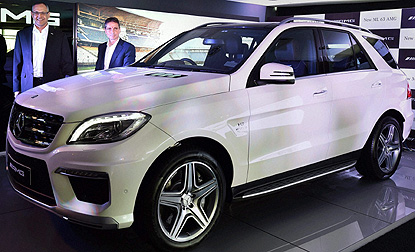
After Tesla, Mercedes-Benz calls India’s import duty “outrageous”

Days after Tesla chief Elon Musk rued about India’s import tax on cars, calling it the “highest in the world,” premier carmaker Mercedes-Benz has urged the government to bring it down if from its “outrageous” levels.
The car manufacturer has said, if not brought down, the steep taxes would lead to penalising of customers who may have to shell out twice the amount of money for their cars than what their counterparts in western markets pay.
Speaking to Times of India, Martin Schwenk, the company’s MD said bringing down the import duties will not only avoid customers from spending more, but also help India foster a market for cars with global technologies.
Also read: CARS24 raises $450 million in funding from DST Global, Tencent, others
“Please remember that currently it is not possible to localise all new technologies, including electrics, in India due to the low levels of sales volumes that we have here. We can’t get customers at these duty levels,” he told TOI.
Stating that he seconds Musk’s demands to lower the duty, Schwenk said, “My only submission is that duties should be reduced for all kinds of high-technology luxury products, and not just for electrics.”
Musk, in his reply to an Indian Youtuber on when Tesla will launch its cars in India, had pointed to the high import duties imposed by the government.
“We want to do so, but import duties are the highest in the world by far of any large country! Moreover, clean energy vehicles are treated the same as diesel or petrol, which does not seem entirely consistent with the climate goals of India,” he had tweeted.
Musk said Tesla will be able to set up a factory in India if it successfully imports vehicles.
Later, Tesla had written to the Niti Ayog, urging it to cut down the import tax of fully assemble electric cars to 40 per cent (now it is 100 per cent).
Amid reports that the Centre might be planning to slash down the import duty for Tesla, the government told the electric vehicle carmaker to first start manufacturing its electric vehicles in the country before any tax concessions are considered in its favour.
India currently imposes 100 per cent import duty on fully imported cars that have a CIF (cost, insurance and freight) value of over $40,000 and 60 per cent import duty on cars which have a CIF value of less than $40,000.
Schwenk called the import duty a “real hurdle for developing the market” as the same in international market is just 10 per cent.
“Finally, it’s the Indian customer that gets penalised. I sell the same car at half the price in the US. The tax burden in India is very high, and slows down the growth,” he told TOI.
Also read: Need tax sops? Then ‘Make in India’: Centre to Tesla
Reuters in a recent report said that the government until August had been mulling to slash down the taxes to 40 per cent from 60 per cent for imported electric vehicles with a CIF value of less than $40,000 and from 100 per cent to 60 per cent for those with a CIF value more than the said amount.
While the demand for tax concession was seconded by many including Hyundai India MD SS Kim, domestic players such as Ola Electric’s Bhavish Agarwal had opposed by stating that Indians should rely on India-made electric vehicles.

